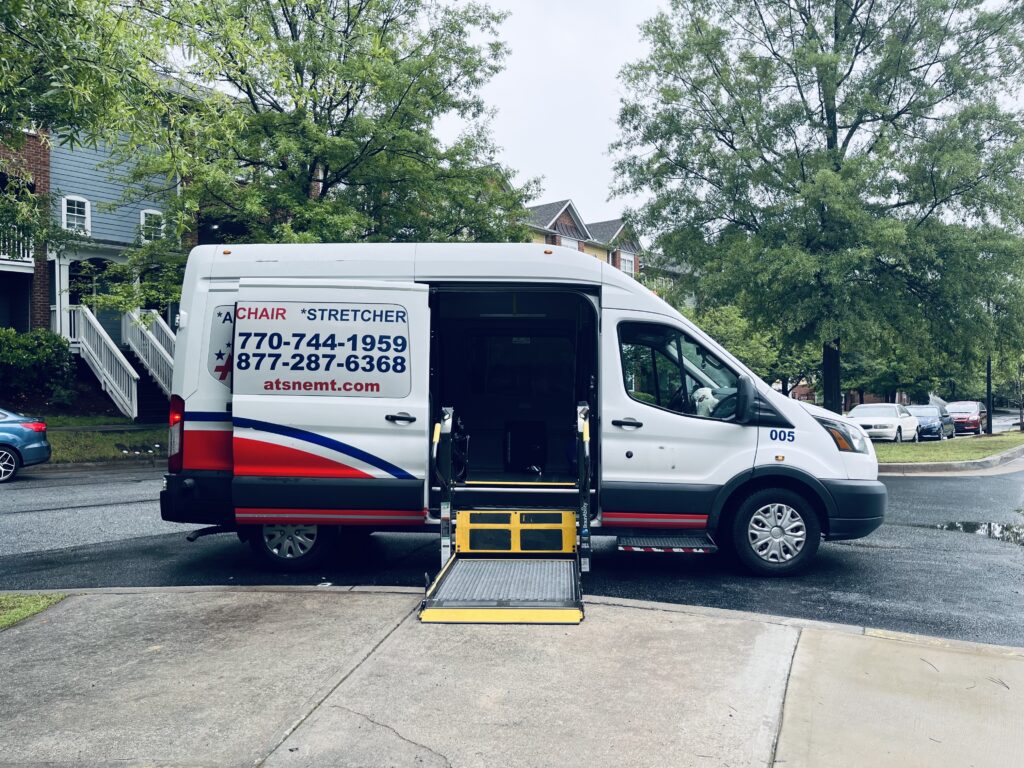A Guide to Long Distance Medical Transport for Seniors
Long-distance medical transport for seniors poses a unique set of challenges, especially when health considerations come into play. Whether it’s a scheduled medical appointment, a move to assisted living, or a desire to reunite with family, finding safe and reliable transportation is crucial. Let’s explore the intricacies of long-distance medical transport for seniors, offering insights, tips, and resources to ensure a secure and comfortable journey.

Specialized Medical Transport Services:
Specialized medical transport services play a crucial role in ensuring the safe and efficient transportation of individuals with medical needs, particularly seniors requiring long-distance travel. These services are designed to address the unique challenges associated with transporting individuals with health conditions, disabilities, or specific medical requirements.
Consider health conditions, urgency, and comfort. Explore options like ambulances, NEMT, air transport, or ground transportation.
Choosing the Right Mode of Transport:
Selecting the appropriate mode of transport is a crucial decision when planning long-distance travel for seniors with medical needs. The choice of transportation can significantly impact the comfort, safety, and overall well-being of the individual. Here are key considerations to help guide the selection process:
Ambulance Services:
Suitability: Ideal for individuals with acute medical conditions or those requiring constant monitoring during transport.
Features: Ambulances are staffed with trained paramedics or emergency medical technicians (EMTs) and equipped with life-saving equipment.
Considerations: Typically used in emergency situations, ambulance services may not be the most comfortable option for non-emergency long-distance travel.
Non-Emergency Medical Transport (NEMT):
Suitability: Suitable for individuals with non-emergency medical needs who require assistance during transport.
Features: NEMT services provide specially equipped vehicles and trained personnel to assist with boarding, disembarking, and meeting the comfort needs of passengers.
Considerations: Ideal for scheduled medical appointments, routine treatments, or non-emergency transfers between healthcare facilities.
Air Medical Transport:
Suitability: Appropriate for long-distance travel when time is of the essence or ground transportation is impractical.
Features: Utilizes medical helicopters or fixed-wing aircraft with onboard medical professionals and equipment.
Considerations: Air medical transport is costly and may be reserved for critical medical situations or when rapid transportation is essential.
Wheelchair and Stretcher Transport:
Suitability: Tailored for individuals with mobility challenges who cannot sit upright during transport.
Features: Vehicles are equipped with secure restraints for wheelchairs or stretchers, providing a safe and comfortable environment.
Considerations: Suited for those with limited mobility who require a lying or seated position during the journey.
Ground Transportation with Medical Accommodations:
Suitability: An option for individuals with manageable health conditions who require limited assistance during travel.
Features: Some traditional transportation methods (e.g., buses, trains, private cars) can be adapted with medical accommodations, such as wheelchair ramps or additional space for medical equipment.
Considerations: Cost-effective for less complex medical needs but may not be suitable for individuals requiring constant medical supervision.
Telemedicine Integration:
Suitability: Relevant for individuals who can benefit from virtual consultations during the journey.
Features: Transportation services equipped with Wi-Fi and communication tools to facilitate remote healthcare interactions.
Considerations: Enhances access to medical support during travel, especially for non-emergency situations.
Consultation with Healthcare Providers:
Suitability: Necessary for all modes of transport to ensure alignment with the individual’s medical needs.
Features: Coordination with healthcare professionals for medical clearances, documentation, and specific instructions for the journey.
Considerations: Healthcare providers can guide the selection process based on the individual’s health status and the nature of the travel.
When choosing the right mode of transport, it’s essential to prioritize the individual’s health condition, comfort, and specific requirements. Consulting with healthcare professionals and specialized transport services can help tailor the transportation plan to the unique needs of seniors with medical considerations during long-distance travel.
Planning for Medical Needs:
Here’s a comprehensive guide to help caregivers and family members plan for the medical needs of seniors during long-distance transportation:
1. Consultation with Healthcare Providers:
Schedule a Pre-Travel Checkup: Visit the primary healthcare provider for a pre-travel checkup to assess the senior’s overall health and obtain medical clearance for the journey.
Discuss Special Requirements: Communicate with the healthcare team about any specific medical requirements during travel, such as the need for continuous oxygen, specific medications, or mobility aids.
2. Compile Essential Documents:
Medical Records: Gather copies of the senior’s medical records, including a list of current medications, allergies, and relevant medical history.
Prescriptions: Ensure a supply of written prescriptions for all necessary medications, specifying dosage instructions and any special considerations.
3. Medication Management:
Organize Medications: Pack all medications in their original containers, clearly labeled with the senior’s name and dosage instructions.
Ample Supply: Bring more than enough medication for the duration of the trip, considering potential delays or unforeseen circumstances.
4. Specialized Medical Equipment:
Identify Necessary Equipment: Determine if any specialized medical equipment is required, such as a wheelchair, oxygen concentrator, or other assistive devices.
Arrange Transportation for Equipment: Coordinate with the transportation service to ensure adequate space and accommodations for necessary medical equipment.
5. Comfort Measures:
Temperature Control: Pack appropriate clothing to ensure the senior is comfortable, considering potential variations in temperature during the journey.
Comfort Aids: Bring items that provide comfort, such as a favorite blanket, pillow, or soothing music, to create a familiar and calming environment.
6. Emergency Preparedness:
Emergency Contact Information: Carry a list of emergency contacts, including primary healthcare providers, family members, and any local contacts at the destination.
Emergency Medications: If applicable, have emergency medications readily accessible and inform accompanying personnel or caregivers about their location.
7. Communication Tools:
Cell Phone and Charger: Ensure the senior has a fully charged cell phone and a charger, facilitating communication with healthcare providers or emergency services if needed.
Telemedicine Apps: Install telemedicine apps on the phone to enable virtual consultations during the journey if required.
8. Personal Comfort and Hygiene:
Hygiene Supplies: Pack personal hygiene items, including wipes, hand sanitizer, and any specific items necessary for the senior’s personal care.
Comfortable Seating: If applicable, bring a cushion or additional padding for comfort during the journey.
9. Meal and Snack Planning:
Special Dietary Considerations: Plan meals and snacks considering any dietary restrictions or preferences.
Hydration: Ensure an adequate supply of water to stay hydrated throughout the journey.
10. Communication with Transport Services:
Inform About Medical Needs: Communicate all relevant medical information to the transportation service, including any specific requirements, assistance needed, or accommodations for medical equipment.
Coordinate with Personnel: Discuss the senior’s medical needs with the transportation personnel, ensuring they are aware of emergency protocols and are prepared to assist as needed.
By taking these comprehensive steps to plan for the medical needs of seniors during long-distance travel, caregivers and family members can contribute to a smooth and secure journey, providing the necessary support for individuals with health considerations.
It depends on the insurance plan. Check coverage details, explore reimbursement processes, and consider additional travel insurance if needed.
Insurance and Financial Considerations:
Financial and insurance factors must be carefully considered in order to guarantee seniors have a seamless long-distance medical travel experience. This involves looking into the insurance coverage that is offered, comprehending the reimbursement procedures, and figuring out what financial aid possibilities are available. Caretakers and family members may ease financial worries and guarantee that their loved ones have access to the medical transport services they need by carefully managing these factors.
Comfort and Safety During the Journey:
Ensuring the comfort and safety of seniors during a long-distance medical transport journey is paramount. Specialized services, equipped with trained personnel and tailored vehicles, prioritize the well-being of passengers. From maintaining proper seating arrangements to temperature control and providing emotional support, these measures aim to create a secure and comfortable environment for individuals with medical needs. By addressing these factors, caregivers can enhance the overall travel experience for seniors, fostering a sense of well-being and security throughout the journey.
Long-distance medical transport for seniors requires careful planning, consideration, and access to specialized services. By following the insights and recommendations provided in this guide, caregivers and family members can ensure that their loved ones receive the necessary medical care during their journey, fostering a sense of security and well-being. Safe travels on the road to better health!

Americ Transit Services: Your Trusted Companion for Safe and Comfortable Long-Distance Journeys
Are you seeking reliable and compassionate long-distance medical transport for your beloved seniors? Look no further! 🌐 Explore the comprehensive services offered by Americ Transit Services, where every journey is more than just transportation – it’s a commitment to comfort, safety, and well-being.
👴💼 Why Choose Americ Transit Services?
🏥 Specialized Medical Transport: Tailored for seniors with unique medical needs.
🚑 Trained Personnel: Compassionate professionals ensuring safety and support.
🌍 Coverage: Seamless long-distance transport across the Georgia.
💼 Door-to-Door Service: Hassle-free, comprehensive assistance from start to finish.
🌈 Our Commitment to Your Peace of Mind:
🤝 Transparent Process: Clear communication on costs.
👨⚕️ Your Loved One’s Comfort and Safety Matter:
🛋️ Comfortable Seating: Specially designed vehicles for a relaxing journey.
🌡️ Temperature Control: Ensuring the right climate for utmost comfort.
🤗 Emotional Support: Compassionate care for a positive travel experience.
🌐 Ready to Begin the Journey? Request a Ride Today!
Experience peace of mind as your loved ones travel with dignity, comfort, and the highest standard of care. Americ Transit Services is your trusted partner for long-distance medical transport, ensuring that every mile is a step towards well-being.
📞 Contact Us Now!
📞 (770) 744-1959 or (877) 287-6368
🚑 Your Journey Starts Here – Choose Americ Transit Services for Compassionate and Reliable Long-Distance Non-emergency Medical Transport! 🌟
Recent Comments